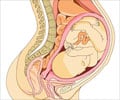Mothers with any form of serious mental illness are more likely to have children who are stillborn or who die within the first month, finds research published ahead of print in the Archives of Disease in Childhood (Fetal and Neonatal Edition).
But the links between the causes of stillbirth and newborn death depend on the type of mental illness the mother has, the research shows.The researchers looked at 1.45 million live births and 7021 stillbirths over a 25 year period from 1973 to 1998 in Denmark, to investigate links with serious mental illness.
But the chances of stillbirth and newborn death from any cause were considerably greater for babies whose mothers had been admitted to hospital for mental illness at any point before the birth of their child, than mothers who had never been admitted.
In all, the mothers of 188 stillborn babies were admitted before the birth, including for schizophrenia and psychotic disorders; mood (affective) disorders, such as manic depression (bipolar disorder); and addiction to drugs or alcohol.
The risk of a stillbirth due to complications during the delivery was more than twice as high among mothers with drug or alcohol dependency.
Women with affective disorders were also more than twice as likely to give birth to a child with congenital abnormalities who was stillborn.
Advertisement
Women with schizophrenia were twice as likely to have a baby who died due to congenital abnormalities soon after birth compared with the general population.
Advertisement
But for most causes of death, the risks of stillbirth or a newborn death were no higher for women with schizophrenia than for women with other serious mental illness.
These findings suggest that factors other than the mental illness itself are likely to be involved, explain the authors.
These may include lifestyle, such as smoking and poor diet, poverty, and poor access to antenatal care, all of which can boost the chances of complications during delivery, a premature birth, or a low birthweight baby.
Source-BMJ
SK















